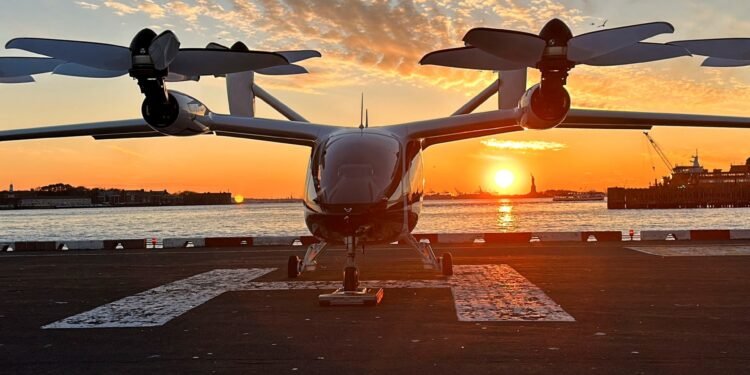The air-taxi market is predicted to grow exponentially by the end of the decade, but experts have warned that its future depends on a well-planned network of vertiports that would need to be integrated into existing infrastructure and supported by advanced air traffic management systems.
By 2029, the air-taxi market is predicted to grow to $80.3bn from the $4.9bn that it was worth last year, according to Spherical Insights, a market research firm. This market demand is “driven by the need for an alternative mode of transportation and the increasing problem of traffic congestion in metro cities”, a report by Mordor Intelligence said.
However, despite the interest and demand, electric vertical take-off and landing aircraft (eVTOL), low-altitude aircraft that can travel between cities and airports avoiding traffic, face a number of challenges before becoming a reality.
“Air mobility is set to transform our skies, much like how cars revolutionised ground transportation in the 20th century,” Amad Malik, an AI and aerospace expert, told media.
“As this technology matures, we’ll see a gradual introduction of various flying vehicles, from small delivery drones to larger air taxis and even flying ambulances. Keeping all this traffic safe and conflict free is going to become a big challenge.”
As well as needing to secure regulatory approval and convince consumers they are safe, eVTOLs need infrastructure for landing and take-off – vertiports.
Aviation news outlet Airports International, citing industry stakeholders, predicts that Advanced Air Mobility (AAM) will only “become a reality in North America and Europe later this decade”. However, it added that “air taxis will be flying passenger services in the Middle East within a couple of years”.
Britain’s Civil Aviation Authority said it was launching a consultation on how these eVTOL airports would fit into existing small airfields, and how they would operate safely and efficiently.
Dubai saw vertiport developer Skyports Infrastructure sign a deal with a Dubai-based provider of paid public parking facilities, to provide parking facilities for vertiports, according to IoT World Today. Dubai’s initial AAM network will consist of four vertiports – at Dubai International Airport, Palm Jumeirah, Dubai Downtown and Dubai Marina.









 United Arab Emirates Dirham Exchange Rate
United Arab Emirates Dirham Exchange Rate